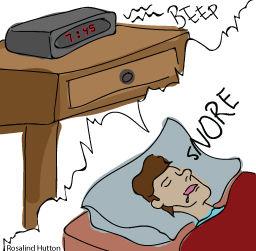During the first semester of my freshman year here at Mississippi State University, I made my schedule to where I had a class at 8 a.m. every day. My misguided logic when creating my schedule was to take my classes as early as possible, so I could be done for the day as early as possible. After barely surviving the semester and encountering serious sleep deprivation, I can say you should avoid 8 a.m. classes for the sake of your much-needed sleep, academic success and your mental health.
It is a fact that sleep is imperative to college students when it comes to both mental health and academic success. While healthy adults need at least seven to nine hours of sleep, teens and younger adults need more averaging at about eight to 10 hours. According to Shelley D. Hershner of the Journal of the Natural Sleep Foundation, primarily 70% to 96% of college students get less than eight hours of sleep per night during the week. This lack of sleep, also known as sleep deprivation, negatively impacts the human mind and body in several ways, such as slowed reaction time, impaired immune function, increased risk of infection, erratic mood swings and much more. The most common cause of sleep deprivation among college students is when students go to bed late to due to studying and wake up for their early morning classes. As a college student, you are likely to stay up until 1 a.m. to 2 a.m. studying or pulling an “all-nighter” at least once a week. Getting an inadequate amount of sleep while needing to wake up at 7 a.m. to prepare for an 8 a.m. class can and will leave you drowsy and unable to pay attention not only in that class, but for the rest of the day.
Most students often sacrifice their sleep to study hoping they may improve their grade in a class. However, losing sleep to study proves to be counterproductive by actually being worse for your grades. The qualities you need to do well on tests, like concentration and alertness, are decreased substantially when you have insomnia or an increased lack of sleep. According to Ronald D. Chervin of Dovepress, sleep deprivation and irregular sleep schedules negatively impacts memory, learning and performance. Students who obtained more sleep, nine hours or more, had higher GPAs and academic performance than students who had less sleep. While you could try to just study earlier and go to bed early for your 8 a.m. class, you more than likely will not be able to do so after a busy college student’s schedule.
In addition, waking up early for an 8 a.m. class after a long night of restlessness can be detrimental to our mental health. According to the University of Georgia’s University Health Center, college students are often at risk for having mental health issues, such as depression and anxiety, and many researchers believe that lack of sleep is a major factor and sign of deteriorating mental health. Also, college is a very stressful time in life for many different reasons, so adding a lack of sleep can only hurt you. Taking an 8 a.m. class only adds to the stress and makes it harder to get breakfast.
While you may think you are a morning person, an 8 a.m. class tends to go against college students’ best interests. Personally, having an 8 a.m. class only made my days longer, increased my chances of being late or skipping classes and made me more restless and irritable than I had ever been. Although you do not have total control over what time a class you need is left available to you, I suggest you strongly try to avoid any class too early for your sleep schedule, especially an 8 a.m. class.
Categories:
Avoid early morning classes at all costs

0
Donate to The Reflector
Your donation will support the student journalists of Mississippi State University. Your contribution will allow us to purchase equipment and cover our annual website hosting costs.
More to Discover





